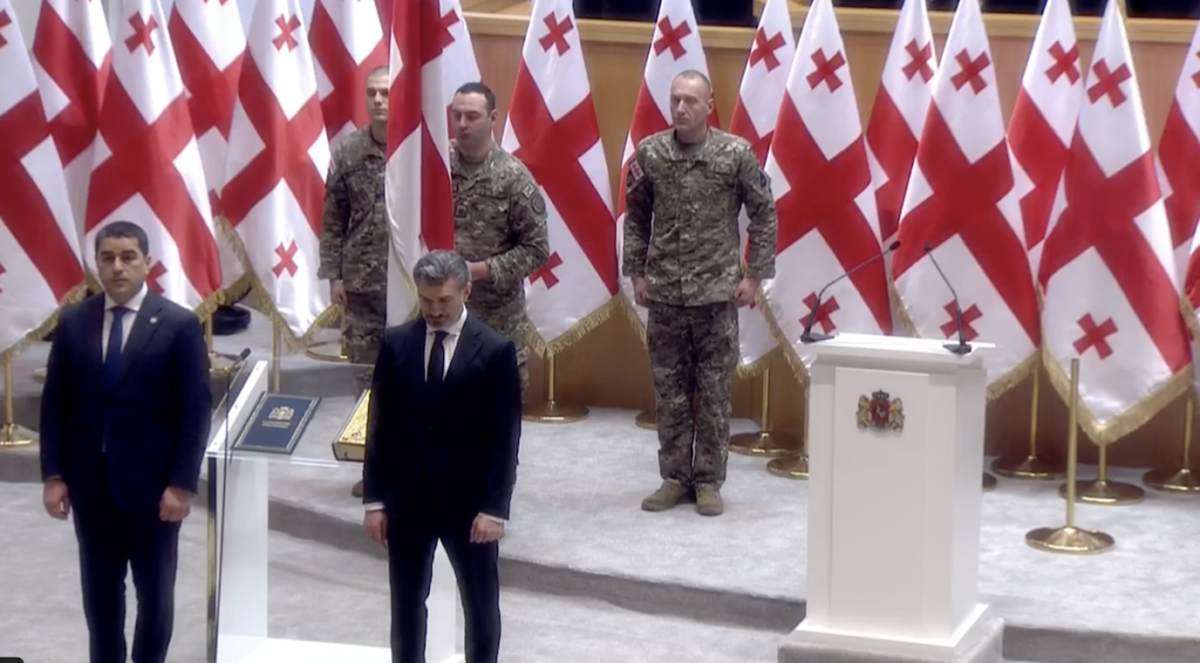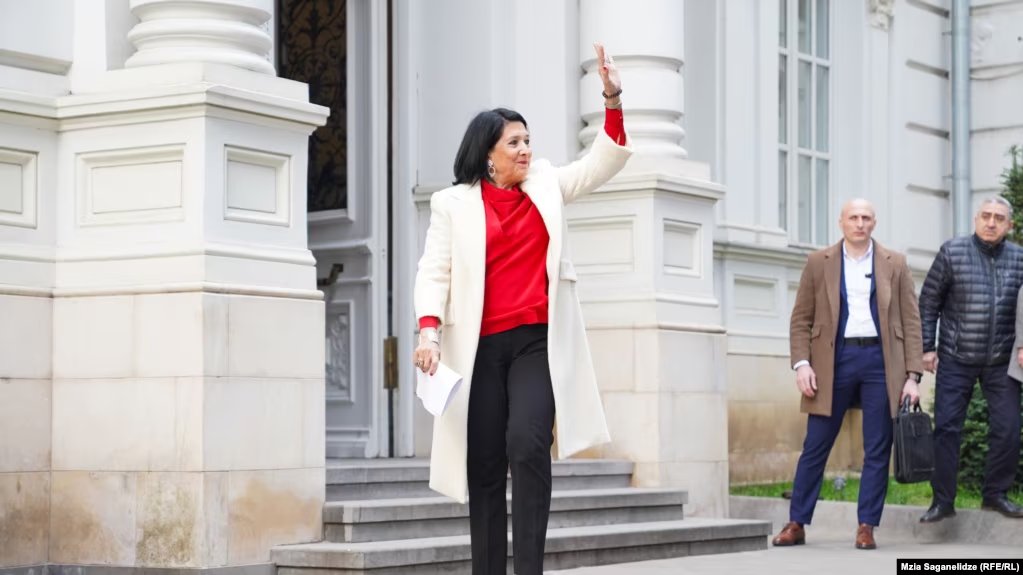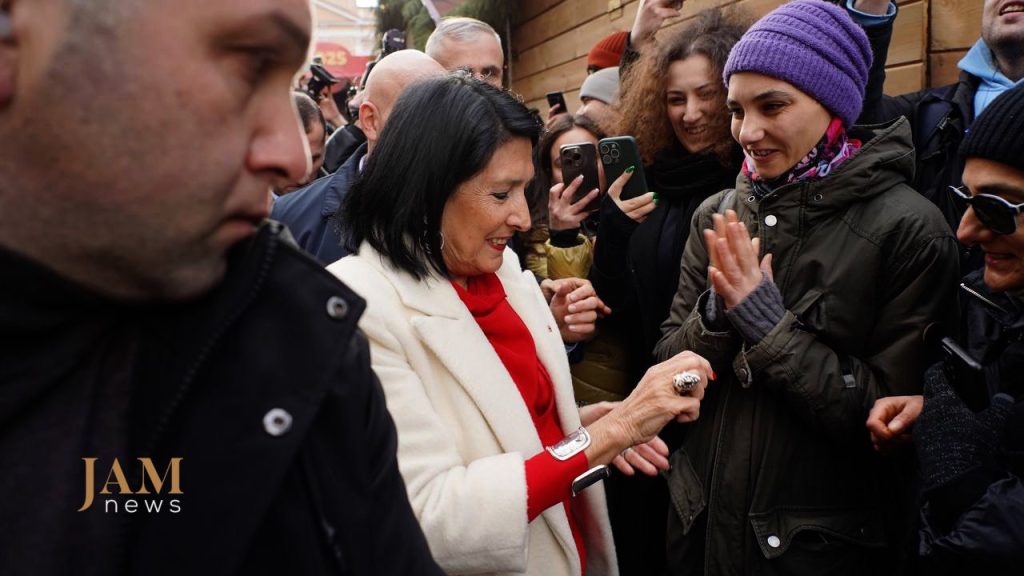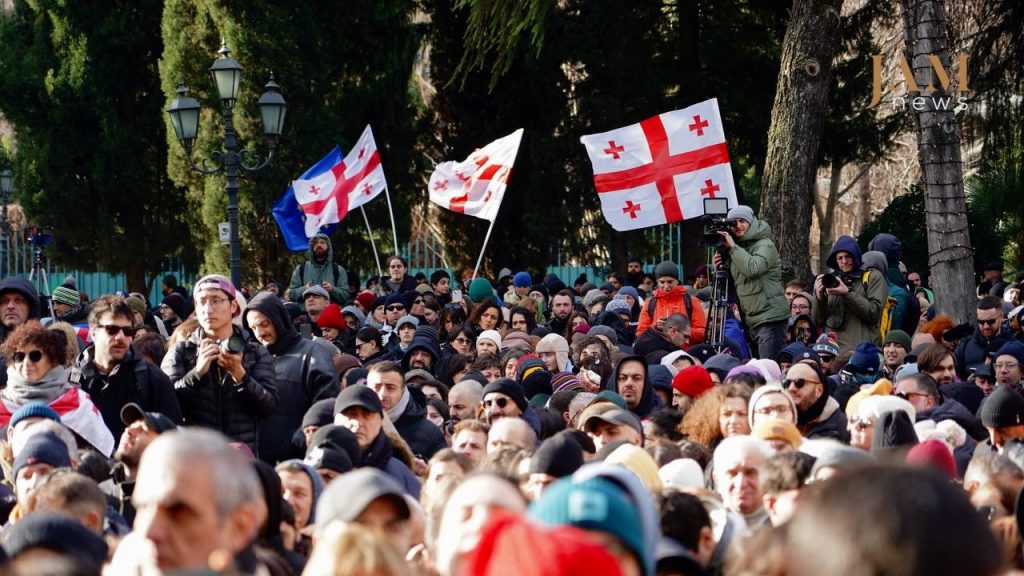Georgia's month-long protests mark a watershed moment that could end the Georgian Dream party's decade-long grip on power. Unlike previous protest movements, this wave has triggered an unprecedented alliance of public demonstrations, business sector resistance, and international sanctions that leaves the government increasingly isolated.
On 29 December, as protests entered their 32nd day, the crisis deepened when President Salome Zourabichvili, viewed as the legitimate president by 46% of Georgians, relocated from her residence, vowing to continue serving as president until new parliamentary elections are held.
Meanwhile, the ruling Georgian Dream party, whose legitimacy is questioned by 61% of Georgians, installed their own president, former football player Mikheil Kavelashvili. He is viewed as legitimate by only 22% of the population.
This move, rather than dampening protest momentum, has only highlighted the growing divide between a government clinging to power and a population demanding change.
What’s next for Georgia after Zourabichvili, who called herself the sole remaining legitimate institution, loses her protection? To understand, let's have an overview of the first month of protests.

How the crisis in Georgia unfolded
The immediate trigger for these protests was the ruling Georgian Dream party's announcement to suspend EU integration on 28 November. While technically, they suspended it until 2028, Georgians understand this as a permanent departure from the European path - implementing necessary reforms would mean the party's loss of power. They cannot openly reject EU integration because they rule over a consistently pro-EU population, with support hovering around 80-85%.
The Georgian Dream's rule has operated as a Trojan horse project of the Kremlin, and a remarkably successful one.
This happened partly because of a false sense of security - many believed Georgians were simply too pro-Western for any government to redirect them into Russia's orbit. Bidzina Ivanishvili, the Russian-made oligarch behind the ruling party, only revealed his grand plan after capturing all state institutions, and when Russia's full-scale invasion of Ukraine made it difficult to maintain a European facade.
Then came the Kremlin-inspired Foreign Agents law - actually two attempts at it - which essentially declares even animal shelters receiving anonymous donations from abroad as national traitors and foreign spies, in a country where businesses already fear funding government opponents lest they face overnight shutdown.
Georgians have been protesting since mid-April. The spring protests felt like a national awakening, with older generations comparing it only to the national liberation struggle of the 1980s. When the law passed anyway, people shifted focus to unseating the government in October's elections.
Despite growing recognition that Georgian Dream's Russian nature made peaceful concession unlikely, several factors fed hope they couldn't cheat:
- the momentum of change at home
- Western frustration with Georgian Dream
- the possibility of countering known fraud tactics through high turnout
- the military's lack of regime support
- and the likelihood of security forces' resistance if actual Russians intervened.
The regime did rig the October parliamentary elections anyway, and the OSCE/ODIHR final report, while not entitled to name the elections illegitimate, essentially did just that.
A period of post-election shock followed, with uncertainty about protest strategy. Public anger ran high, but street protests remained modest, confused, and exhausted, until the next catalyst -- the government's U-turn on EU integration on 28 November, which led hundreds of thousands to take to the streets.
How are these protests different?
As opposed to the protests sizzling since mid-April, they erupted simultaneously in cities and towns across Georgia, rather than following Tbilisi's lead as usual, and the atmosphere carried unprecedented anger -- this time, the regime could not placate anyone with tactical concessions or electoral promises.
Crackdowns began the very first evening, and unlike previous protests, police aimed to punish protesters, not just clear Rustaveli Avenue. The 30 November crackdown saw unprecedented police violence, sending a clear message that protesters now risked not just arrest, but their lives.
However, instead of suppressing dissent, this brutality catalyzed broader resistance, losing the government's key supporters and uniting previously disparate opposition groups. The regime soon discovered that neither Titushky (regime thugs) nor torture, arbitrary kidnappings, or arrests could deter the protesters.
As people grew angrier, the regime lost vocal celebrity supporters, and protesters quickly adapted to their violent tactics. In response, the authorities shifted strategy - rushing through repressive laws, purging the public sector, and seemingly betting on protest fatigue. This mirrors their playbook from Russia.
What have the protests yielded for Georgians thus far?
The protests have strengthened Georgians' confidence and unity while further isolating the regime both domestically and internationally.
The movement has spawned hundreds of diverse marches - professional groups, hobby groups, neighborhoods, ancestral regions, and more. This happens even in towns of just 3,000 people, like Chkhorotsku. The protests unite all backgrounds and generations, with seemingly every passing car honking in solidarity.
Even the traditionally conformist business sector found its voice, with around 3,000 large, medium, and small businesses joining the "Free Business" demand for new, free, and fair elections and the release of unlawfully detained protesters. They maintain that this crisis transcends politics and threatens a deep and total crisis, including economic collapse. Georgia's two dominant banks, TBC Bank and Bank of Georgia, stand with the protesters and support affected persons and businesses.
Several ambassadors have stepped down.
A high-level Special Task Department official overseeing police crackdowns resigned, fled under US protection, and began exposing the regime, revealing that all orders come from Moscow. Dissent in the public sector is widespread, with hundreds joining petitions.
The Baltic states, the United Kingdom, Ukraine, and the United States have imposed sanctions on Georgian authorities.
The US sanctions include Global Magnitsky Act sanctions against the so-called Minister of Internal Affairs Vakhtang Gomelauri and the long-awaited sanctions against Bidzina Ivanishvili himself. Ivanishvili faces sanctions under the Russian Harmful Foreign Activities (E.O. 14024), with experts noting the particular document against him leaves room for him to back down.
Notably, the regime promoted and awarded those sanctioned, seen as a move to prevent regime disintegration.
International solidarity with Georgia's people continues growing. On 29 December, the Baltics and Nordics issued a joint statement calling for possible new elections based on the OSCE/ODIHR report and recommendations.
US Congressman and Chair of the US Helsinki Commission Joe Wilson invited President Salome Zourabichvili to President-elect Trump's inauguration as Georgia's only legitimate leader.
Calls for supporting Georgia remain strong in the European Parliament as well.
What’s next after 29 December?
While Salome Zourabichvili has been criticized for vacating the Presidential Residence despite vowing to continue her term, for most Georgians, the building holds little symbolic importance, and the public showed little appetite for making it a battleground. As the president stated while leaving the Palace, she carries legitimacy within herself -- a sentiment the majority seems to affirm.

Her continued presence would have heightened tensions, but short-term temperature spikes might not serve long-term benefits. She can now pursue diplomacy as Georgia's legitimate leader, and it's questionable whether a top-down escalation would truly serve this otherwise grassroots, bottom-up movement.
The President had previously called on Bidzina Ivanishvili to meet and schedule new elections, arguing that new elections would happen eventually - either through regime compromise or regime collapse.
Currently, this remains a war of attrition. Georgians focus on regime collapse. For society to shift toward actively toppling the government, they need to see that collapse is very much possible.
It is possible if Georgians persist at home, continuing with an even deeper dissent of the business sector. From abroad, non-recognition of the regime and refusal to engage with them sets the standard for not betraying Georgians.
Many argue that sanctions don't help, but typically, sanctions target already consolidated dictatorships rather than regimes that are still consolidating power.

Zourabichvili outlined several priority areas for the process ahead:
- She will develop detailed specifications for conducting new elections to prevent Georgians from being deceived again.
- She plans to work with all stakeholders on this issue and called on everyone who aspires to participate in the country's political scene - both established and emerging forces - to prepare for elections that will "come very soon."
- She advocates strengthening independent media through all available means, bolstering foundations that support those affected, from prisoners to repressed public sector workers, and ensuring lawyers stand ready to defend people.
- The President will meet with the Georgian public in the regions and maintain close contact with businesses that have recognized the stakes and broken from their typical Georgian conformism. She will also continue representing Georgia abroad, noting that she already has several high-profile visit invitations.
To conclude, several invaluably solid factors work in Georgians' favor:
- widespread anti-Kremlin nationalism;
- the sense of reclaiming the nation's pre-colonial "true" character;
- the simultaneous emergence of a new nation - a civic, responsible, truly European Georgia, the Third Republic;
- and the fact that there remain no more concessions to make, no more elections or promises to be deceived by, as the people have experienced it all.
Related:
- Georgia’s democratic crisis deepens as thousands rally against “Russian puppet”
- Watch how Marika Mikiashvili explains the reasons for Georgia's protests in 15 minutes:
- Or read the text version: “Russia makes nations slaves”: a Georgian activist explains her country’s revolt
- How Georgia’s pro-EU movement built its own intelligence network
- “Not another Russian colony”: Georgia erupts against Moscow’s shadow rule
- From Rose Revolution to “Russian Dream”: Georgia at breaking point with pivotal pro-EU protests
Editor's note. The opinions expressed in our Opinion section belong to their authors. Euromaidan Press' editorial team may or may not share them.
Submit an opinion to Euromaidan Press

